小升初英语语法-形容词、副词
小升初英语笔记整理归纳重点

小升初英语笔记整理归纳重点
小升初英语复习要点归纳:
1. 名词复数规则:一般情况下,直接加 s,如:book-books, bg-bas, at-ats, bd-beds;以 s、x、h、h 结尾,加 es,如:sbue-sbes, box-bxes, bruh-brshes,atch-waths;以辅音字母 y 结尾,变为 i,再加 es,如:amly-mils,strawbrry-strwrie;以 f 或 fe 结尾,变 f 或 fe 为 v,再加-es,如:knif-knie。
2. 代词:人称代词主格宾格形容词性物主代词 (短) 名词性物主代词 (长)。
3. 语法知识:几种基本的时态小学阶段就会接触到,小学英语会考到的无非是一般现在时、现在进行时、一般过去时和将来时。
要注意时态的正确使用和区分。
4. 动词:要注意动词的时态和语态,以及动词的不规则形式。
5. 形容词和副词:小学阶段的形容词和副词比较级和最高级形式要熟练掌握,同时要注意形容词和副词的用法和区别。
6. 阅读和写作:英语阅读和写作同时抓,阅读可以增加词汇量和语感,写作可以提高语言表达能力和语法运用水平。
要注意句子结构和语法的正确性。
7. 单词和词汇:小学阶段的单词和词汇很重要,学生必须熟练掌握重点单词、词汇的拼读、记忆。
可以将单词有意识地分类记忆,如颜色、食物、生活用品等。
以上是小升初英语复习的重点内容,考生需要认真梳理和总结。
同时,要注意练习和模拟考试,不断提高自己的英语水平和应试能力。
英语六年级上册小升初六年级英语语法讲义:形容词、副词(一)
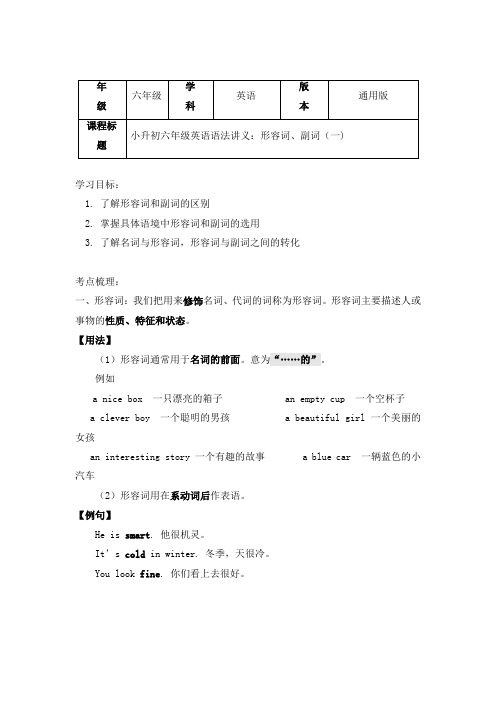
学习目标:1. 了解形容词和副词的区别2. 掌握具体语境中形容词和副词的选用3. 了解名词与形容词,形容词与副词之间的转化考点梳理:一、形容词:我们把用来修饰名词、代词的词称为形容词。
形容词主要描述人或事物的性质、特征和状态。
【用法】(1)形容词通常用于名词的前面。
意为“……的”。
例如a nice box 一只漂亮的箱子an empty cup 一个空杯子a clever boy 一个聪明的男孩 a beautiful girl 一个美丽的女孩an interesting story 一个有趣的故事 a blue car 一辆蓝色的小汽车(2)形容词用在系动词后作表语。
【例句】He is smart. 他很机灵。
It’s cold in winter. 冬季,天很冷。
You look fine. 你们看上去很好。
(3) as…as (与……一样), not as (so)…as (与……不一样)中间用原级。
【例句】The story is as interesting as that one. 这个故事和哪个一样有趣。
The question is not as (so) difficult as that one. 这个问题不如那个难。
(4)形容词的反义词【例句】Zhao Benshan is old.Xiao Shenyang is young.(5)可以表示性质、特征和状态。
Tony is a good lion. (表性质)It’s a red lantern. (表特征)She is asleep. (表状态)【即学即练】请同学们说出下列词语的反义词:beautifulbiggoodhot leftblackthickquickoldimportantcomfortablelongeasydirtytall答案:ugly, small, young, bad, cold, right, white, thin, slow, unimportant, uncomfortable, short, difficult, clean, low二、副词:用于说明事情发生的时间、地点、原因、方式等含义或说明其他形容词或副词程度的词,我们称之为副词。
(完整版)小学英语语法——形容词副词
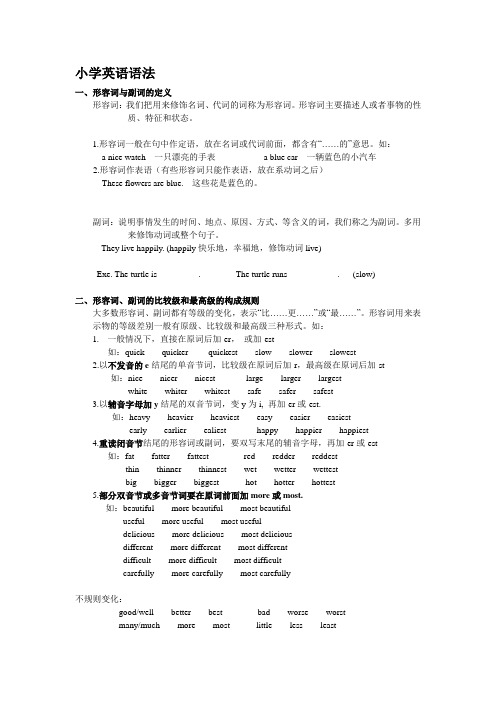
小学英语语法一、形容词与副词的定义形容词:我们把用来修饰名词、代词的词称为形容词。
形容词主要描述人或者事物的性质、特征和状态。
1.形容词一般在句中作定语,放在名词或代词前面,都含有“……的”意思。
如:a nice watch 一只漂亮的手表 a blue car 一辆蓝色的小汽车2.形容词作表语(有些形容词只能作表语,放在系动词之后)These flowers are blue. 这些花是蓝色的。
副词:说明事情发生的时间、地点、原因、方式、等含义的词,我们称之为副词。
多用来修饰动词或整个句子。
They live happily. (happily快乐地,幸福地,修饰动词live)Exe. The turtle is _________. The turtle runs ___________. (slow)二、形容词、副词的比较级和最高级的构成规则大多数形容词、副词都有等级的变化,表示“比……更……”或“最……”。
形容词用来表示物的等级差别一般有原级、比较级和最高级三种形式。
如:1.一般情况下,直接在原词后加-er,或加-est如:quick------quicker-------quickest slow------slower------slowest2.以不发音的e结尾的单音节词,比较级在原词后加-r,最高级在原词后加-st如:nice------nicer------nicest large------larger------largestwhite------whiter------whitest safe------safer------safest3.以辅音字母加y结尾的双音节词,变y为i, 再加-er或-est.如:heavy------heavier------heaviest easy------easier------easiestearly------earlier------ealiest happy------happier------happiest4.重读闭音节结尾的形容词或副词,要双写末尾的辅音字母,再加-er或-est如:fat------fatter------fattest red------redder------reddestthin------thinner------thinnest wet------wetter------wettestbig------bigger------biggest hot------hotter------hottest5.部分双音节或多音节词要在原词前面加more或most.如:beautiful------more beautiful------most beautifuluseful------more useful------most usefuldelicious------more delicious------most deliciousdifferent------more different------most differentdifficult------more difficult------most difficultcarefully------more carefully------most carefully不规则变化:good/well------better------best bad------worse------worstmany/much------more------most little------less------leastfar------farther------farthest (指距离的远近)far------further------furthest (表示程度上更进步)old------older------oldest (表示年纪大)old------elder------eldest (表示长幼关系)三、形容词、副词比较级的用法表示两者间的比较用比较级。
小升初英语复习:形容词、副词

(1) “A + be +形容词比较级+ than + B”意思为“A比B更……”。
如:My pen is cheaper thanyours . 我的笔比你的便宜。
Tom runs faster thanyou. 汤姆比你要跑得快。
(2) 进行选择性比较时,可用“which/ who+be+形容词比较级,A or B ?”表示“A和B中,哪一个/ 谁更……..?”。
如:Who is taller (tall), Lucy or Lily? 露西和丽莉谁更高?(3) “比较级 + and + 比较级”或“more and more +原级”表示“越来越……”如:It becomes warmer and warmer when spring comes.春天来了,天气变得越来越暖和了。
(4) “the +比较级……, the+比较级......”,表示“越……越……”如:The more money you make, the more you spend.钱你赚得越多,花得越多。
温馨提示:a bit, a little, much, a lot, still, even 可修饰形容词或者副词的比较级。
Peter is much taller(tall) than Daming. 彼得比大明高得多。
(三) 最高级用法形容词、副词的最高级形式主要用来表示三者或三者以上人或事物的比较,表示“最……”的意思。
句子中有表示范围的词或短语。
如:of the three, in our class等。
结构:(1) Who + be + the + 形容词最高级,A, B or C? 表示“ABC中谁最…..?”Who is the most beautiful (beautiful)girl, Lily, Lucy or Lingling?丽莉、露西和玲玲谁是最漂亮的?(2) Which + be + the + 形容词最高级,A, B or C? 表示“ABC中哪一个最…..?”Which bag is the heaviest(heavy), the yellow one, the red one or the black one?哪个包包最重,黄色的,红色的还是黑色的?(3) A + 谓语 + the + 形容词/副词最高级 + 表示范围的短语(of/ in…) .表示“A在哪一范围内是最…..?”如:He is the tallest (tall) in our class. 他在我们班里是最高的。
2023年小升初英语语法总结及习题形容词和副词的比较级

形容词副词比较级最高级练习题(一)写出下列形容词与副词的比较级与最高级形式:long __________ __________ wide ____________ __________fat __________ __________ heavy __________ __________slow __________ __________ few __________ __________badly __________ __________ difficult __________ __________far __________ __________ quickly _________ ___________happy __________ __________unhappy __________ __________fast __________ __________ wide __________ __________easy __________ __________ small __________ __________large ________ _________ dirty __________ __________long __________ __________ rude __________ __________busy _______ __________ hot __________ __________thin ________ _________ fat __________ __________few __________ __________ good / well __________ __________little________ _________ busy __________ __________ill / poor / bad / /badly __________ __________old __________ __________ thin __________ __________many / much __________ __________slow__________ __________ delicious _______________ _____________tidy __________ __________ careful __________ __________ hard ____________________ nice __________ __________brave __________ __________ pretty __________ __________lazy __________ __________ dirty __________ __________dry __________ __________ busy __________ __________slim __________ __________(二)、用所给词的对的形式填空:1.Which is_________(easy)to learn , fishing or swimming?2.Shanghai is larger than _________city in Sichuan.3.In Changchun , the Jing Yue Forest Park is much_____ (clean)than that in the center of the city.4.It makes__________ (little)time to go to Beijing by plane than by train5.Mum,this T-shirt is much too small for me. Would you buy me a_____________(large)one?6.Xi'an is one of _____________(old)capital in China.7.____________(few)children there are in a family,_____________(good)their life will be.8.It will be bad for your health to eat __________(much)food and take__________(little)exercise.9.Now China has joined WTO, so I think English is_____________(useful)than before.10.Of all his subjects, Tom is_____________(good)at English.11.Who is_____________(interested)in Chinese in your class at the moment?12.Book II is_____________(different)than Book IV.13.The Great Wall of China is one of ______________________(great)wonders in the world14.She is becoming_____________(beautiful)than before.15.The weather in Fujian is better than_____________ in Wuhan.16.The texts in Book II are much easier than _____________in Book IV.17.The weather is getting _____________ and_____________(cold).18.The _____________(much),the_____________ (good).19.The_____________(much)you practice, the_____________(easy)it becomes.20.Which lesson is _______________________ (difficult) in Book 2?21.Alice writes ______________________(carefully ) than I.22.This story is _____________________( interesting) than that one.23.This kind of food must be _________________ ( delicious )than that one.24.Beihai park is one of ____________ (beautiful ) parks in Beijing.25.Who’s _________________(careful), Tom, Jim or Kate?26.That is _________________(easy) of all.27.He is ___________________(clever )boy in the class.28.John is _________________( short) than Tom.29.She is __________________(pretty)girl in the group.30.Can you show me________(near) shop here?31.This bridge is as _______ ( long) as that one, but it is much ______ (wide) than that one.32.I thought English is one of _________ (important )subjects in middle school.33.I am only one year ________ (young) than you..34. Miss Chen is __________ _________than Mr. Wang. (popular)35. The basketball _______ ________ ________ the baseball. (big)36. Question A _______ ________ _________ ________ Question B. (important)37. Toronto is ______________ _______________ city in Canada. (large)38. Playing computer games is_______________ _______________ _______________ of all the activities.(interesting).39. The Nile(尼罗河) is _______________ _________________river in the world. (long)40. Good health is _______ _______ ________thing life. (important)41. Taking a taxi is _______________ ________________ way to get to the airport. (easy)42. Test 1 is _____ _______ _________of all the tests.(difficult)43. He is ________than any other boy in the class.(clever)44. She is________________ than all the other students. (young)45. The window is ________ ________ of the two. (narrow)46. Where is the _________________bus-stop? (near)47. He is one of ________ ________ _______Politicians. (famous)48. Tom drives much ________ ________than John. (careful)49. The white flower is ________(beautiful). The yellow flower is _____________ (beautiful)than the white flower. The red flower is the _____________ _______________ of the three.50. Which is ________________ (big),the sun, the moon or the earth?51. Which is _______________ (beautiful), the black coat or the blue one?52. This moon cake is _____________ (cheap) of all.53. He is ________________ (strong) in the class.54. English is _____________ (widely) spoken in the world.(三)、翻译句子:1.这本书比那本书好多了。
小升初英语总复习四:形容词副词比较级最高级_2
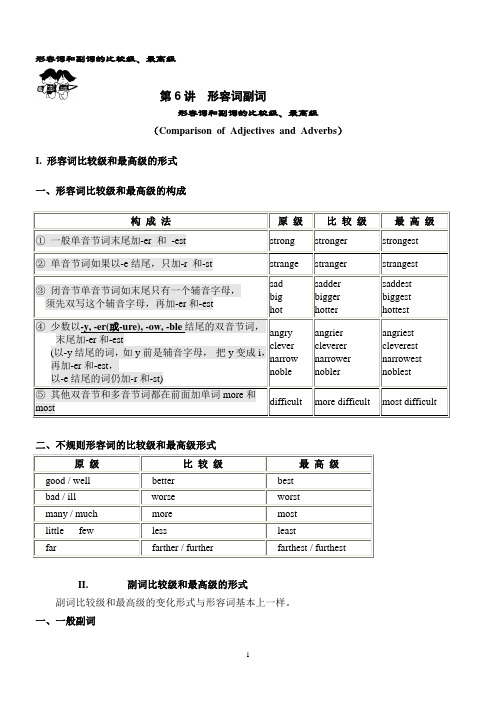
形容词和副词的比较级、最高级第6讲形容词副词形容词和副词的比较级、最高级(Comparison of Adjectives and Adverbs)I. 形容词比较级和最高级的形式一、形容词比较级和最高级的构成二、不规则形容词的比较级和最高级形式II.副词比较级和最高级的形式副词比较级和最高级的变化形式与形容词基本上一样。
一、一般副词hard→harder →hardest fast→faster →fastestlate→later →latest early→earlier →earliest二、特殊副词well →better →best much →more →mostbadly →worse →worst little →less →least三、开放类副词开放类副词即以后缀-ly结尾的副词不能像形容词那样加-er或-est,而应在副词原形前加more或m ost。
如:quickly →more quickly →most quickly quietly →more quietly →most quietlyIII.形容词与副词比较级和最高级的基本用法一、比较级1.比较级通常由“形容词(副词)比较级+than+…” 构成,表示在两者中间一方比另一方“更加……”。
连词than后可接句子,也可接名词、代词、名词短语、介词短语、动词、动词不定式、-ing结构和-ed结构,有时也可省去than。
如:Mary is happier than Jane. 玛丽比珍妮幸福。
(形容词和系词连用)He lives more happily than I.他过得比我幸福。
(副词修饰行为动词)2.注意than前后两项相比较的人或事物要一致。
如:The purpose of the research had a more important meaning for them than it did for us.Sound travels faster through water than through air.3.比较级前还可用much, even, still, a little等词语来修饰,表示“……得多”,“甚至……”,“更……”,“……一些”等意思。
小升初英语--形容词-副词
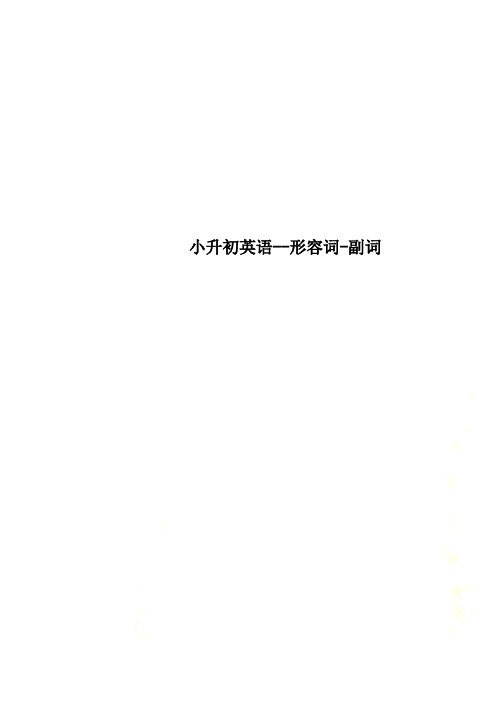
小升初英语--形容词-副词小升初英语形容词、副词(一)知识点一、形容词副词1.形容词:形容词(adjective),简称adj.很多语言中均有的主要词类中的一种。
主要用来修饰名词的词,表示事物的特征。
形容词用来修饰名词或代词,表示人或事物的性质、状态,和特征的程度好坏,与否.例:Tom is my good friend. He is tall. She is beautiful.2.副词副词在句子中修饰动词,形容词,副词或整个句子。
用来说明动作或状态的特征,时间,地点,程度,方式等情况。
1)副词按其用途和含义可分为下面五类:➢时间副词:时间副词通常用来表示动作的时间。
常见的时间副词有:now ,today, tomorrow, early。
He often comes to school late. What are we going to do tomorrow?➢地点副词:地点副词通常用来表示动作发生的地点。
常见的地点副词有:here, there, home, down, up, off, on, in, out等。
:I met an old friend of mine on my way home.➢方式副词:方式副词一般都是回答“怎样的?”这类问题的。
常见的方式副词有:badly, carefully, suddenly, happily, slowly, well, fast, The old man walked home slowly. Please listen to the teacher carefully. ➢程度副词:程度副词多数用来修饰形容词和副词,有少数用来修饰动词或介词短语。
常见的程度副词有:much, (a) little, a bit, very, so, too。
She sings quite well. I can hardly agree with you.➢疑问副词:用来引导特殊疑问句的副词。
小升初英语语法汇总
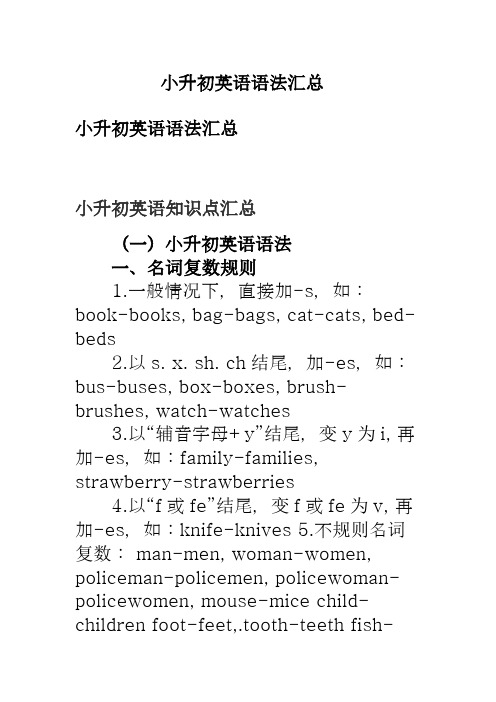
小升初英语语法汇总小升初英语语法汇总小升初英语知识点汇总(一)小升初英语语法一、名词复数规则1.一般情况下,直接加-s,如:book-books, bag-bags, cat-cats, bed-beds2.以s. x. sh. ch结尾,加-es,如:bus-buses, box-boxes, brush-brushes, watch-watches3.以“辅音字母+y”结尾,变y为i, 再加-es,如:family-families, strawberry-strawberries4.以“f或fe”结尾,变f或fe为v, 再加-es,如:knife-knives5.不规则名词复数: man-men, woman-women, policeman-policemen, policewoman-policewomen, mouse-mice child-children foot-feet,.tooth-teeth fish-fish, people-people, Chinese-Chinese, Japanese-Japanese二、一般现在时1.一般现在时表示经常或习惯性的动作,也可表示现在的状态或主语具备的性格和能力。
2.一般现在时中,没有be动词和情态动词,主语为第三人称单数的肯定句,动词要按规则加上s,主语是非第三人称单数的肯定句,动词用原形。
3.在一般现在时中,句中有be动词或情态动词时,否定句在be动词和情态动词后加not,一般疑问句将be动词或情态动词放在句首。
4.在一般现在时中,句中没有be动词或情态动词时,主语为第三人称单数的否定句在动词前加does+not (doesn’t),一般疑问句在句首加does,句子中原有动词用原形;主语为非第三人称单数,否定句用do+not (don’t),一般疑问句在句首加do,句子中动词用原形。
动词+s的变化规则1.一般情况下,直接加-s,如:cook-cooks, milk-milks2 .以s. x. sh. ch. o结尾,加-es,如:guess-guesses, wash-washes, watch-watches, go-goes3.以“辅音字母+y”结尾,变y为i, 再加-es,如:study-studies三、现在进行时1.现在进行时表示现在正在进行或发生的动作,也可表示当前一段时间内的活动或现阶段正在进行的动作。
- 1、下载文档前请自行甄别文档内容的完整性,平台不提供额外的编辑、内容补充、找答案等附加服务。
- 2、"仅部分预览"的文档,不可在线预览部分如存在完整性等问题,可反馈申请退款(可完整预览的文档不适用该条件!)。
- 3、如文档侵犯您的权益,请联系客服反馈,我们会尽快为您处理(人工客服工作时间:9:00-18:30)。
六、形容词、副词:1、形容词:用来修饰名词,表示人或事物的性质、状态和特征的词,叫形容词。
1)形容词的句法作用:作句子中名词的定语、句子的表语以及宾语补足语。
例如:You can see a lot of beautiful flowers in the garden.(定语)Your coat is too small.(表语)The old woman keeps everything clean and tidy.(宾语补足语)【注意】:有些形容词只能作表语,如:alone(独自的), afraid(害怕的), asleep(睡着的), awake (醒着的), alive(活的)ill等。
例如:例如:She is alone.她一个人。
I am afraid of dogs. 我害怕狗。
Don’t wake the sleeping baby up. He is asleep.The old man is alone.2)形容词在句子中的位置:(1)形容词作定语时通常放在名词的前面,如:a big apple(2)多个形容词做定语时排列的先后顺序是:1)冠词或形物代2)数词3)性质4)大小5)形状6)表示老少,新旧7)颜色8)事务、人的国籍、质地、用途。
例如:【注】:冠词—数量—大小——长短——新旧——国籍——材料如:His grandpa still lives in this small short house. 他爷爷还住在这个矮小的房子里。
The woman bought two beautiful Chinese plates. 那个妇女买了两个漂亮的中国盘子。
(3)形容词用来修饰something, anything, nothing, everything等不定代词,要放在这些词的后面。
例如:You’d better tell us something interesting.The police found nothing strange in the room.Something serious has happened to him.(4)表示“长、宽、高、重、老、远离”的表示数量的词组的用法。
如:He’s 1.8 metres tall. (他身高1.8米。
)The moon is about 380,000 kilometres away from the earth.(月球离地38万公里)One day, a young man, twenty-five years old, came to visit the professor.有一天,一位25岁的年轻人来拜访这位教授。
I live in a building about fifty meters high. 我住在一做大约50米高的大楼里。
(5)形容词短语做定语时要后置。
如:They are the students easy to teach. 他们是很容易教的学生。
We live in a house much larger than yours. 我们住的房子比你们的大得多。
(6)作表语时放在系动词之后。
如:The price sounds reasonable.(这个价格听起来算是合理)(7)作宾语补足语时放在宾语之后。
如:We must try our best to keep our environment clean.3)有关形容词的用法辨析:(1)whole与all:记住两个词序:①the whole + 名词;②all (of) the + 名词。
如:He was busy thewhole morning.(整个早晨他都很忙) / He can remember all the words he learns.(他能记住学过的所有单词)(2)tall与high, short与low:指人的个子时用tall与short;指其他事物时一般用high与low。
如:He’s very tall/short.(他个子高/矮) / Tall trees are standing on both sides of that avenue.(大道的两侧有高大的树木) / A few people live on high mountains.(少量的人住在高山上)(3)real与true:real一般指东西的真假, 译为“真的”;而true则指事情或消息的可靠性, 译为“真实的”。
如:This is a real diamond(钻石) and it’s very expensive. (这是货真价实的钻石,非常贵) / --Is that true? --Yes. I heard it with my own ears. (那真实吗?是的,我亲耳所听)(4)interested与interesting的区别:interesting指人或东西―有趣的‖,作定语或表语,而interested则表示人对别的事物―感兴趣的‖,只能作表语。
如:The man is very interesting and all the children like him. (这个人很有趣,孩子们都喜欢他)/ This book is interesting and you can really enjoy yourself.(这本书很有趣,你会真正获得享受) / I am interested in science.(我对自然科学感兴趣)(5)such用法:such + a(n) + 名词(单数)(+that从句)。
如:I have never seen such a foolish(愚蠢的)boy.(我从来没有见过这么蠢的男孩) / He had such a terrible accident that he could never forgetit.(他遭遇了这么可怕的事故,他永远也不会忘记)(6)good与well:表示―好‖时,作定语或表语用good,作状语用well;表示―(身体)好‖时用well.如:Doing sports is good for us.(进行运动对我们有益) / Study well and make progress every day.(好好学习,天天向上) / --How are you?—I am very well.(你好吗?我很好。
)(7)nice与fine:的区别:nice表示令人愉快的, 可以指东西、人物外表等;fine一般指身体或天气好。
如:Let’s go and share(分享) the nice cake.(我们去分享那块美味的蛋糕吧) / She is a nicegirl.(他是个漂亮的姑娘) / What a fine day!(多好的天气!) /He’s fine recently(最近).(近来他身体不错)(8)too much与much too:too much表示―太多的‖,修饰事物数量;much too表示―太过,过分‖,修饰形容词或副词。
如:I am full because I have had too much rice.(我饱了,因为我吃了太多的米饭) / That coat is much too dear.(那件大衣太贵了)(9)quick、fast与soon:quick与fast基本同义, quick往往指反应速度快, fast往往指运动速度快, 而soon则表示时间上很快即将发生。
如:After a quick breakfast, he hurried to school leaving his bag at home.(匆匆地吃过早饭,他朝学校赶去,却把书包忘记在家) / A train is much faster than a bus.(火车比公共汽车快得多) / His father will be back to China very soon.(他父亲很快就要返回中国) (10)lonely与alone:lonely是表示心理活动的形容词, 意思是:―孤独的,寂寞的‖,作定语或表语;alone的意思是:―独自的, 单独的‖,指无人陪伴, 仅作表语, (作为副词的alone可作状语)。
如:He lives alone but he doesn’t feel lonely.(他一人独住,但是并不感到孤独)/ He is a lonely person.You can not easily get on well with him.(他是个孤独的人,你要和他相处好实在不易)(11)other与else的区别:两个词都可以作形容词, 但是用法不同, other放在名词前;else修饰不定代词、疑问词、little、much,后置, 另外, or else表示―否则‖,是连词。
如:The other students are on the playground.(其他学生在操场上) / Who else can work out this maths problem?(还有谁能解出着道数学题?) / This is nobody else’s money. It’s mine.(这不是别的什么人的钱,是我的。
) / Do you have anything else to say for yourself?(你还有什么要为自己说的吗?(12)sick与ill区别:sick和ill都表示―生病的‖,但是,sick可以做定语、表语,而ill只能做表语。
如:He has been ill/sick for a long time and he is very weak now.(他病了很久,现在非常虚弱) / Vets help treat sick pets and most of the pets’ owner s like them.(兽医帮助诊治患病的宠物,很受宠物主人们的喜爱)(13)the poor(穷人们) / the rich(富人们) ; good / bad ; young / old ; healthy / ill ; living / dead ;black / white (表示人种等)等用法:―the+形容词‖这一结构可以表示一类人, 复数含义。
如:We must try our best to help the poor.(我们应该尽力帮助穷人们)The rich never know how the poor are living.(有钱人哪知穷人怎么过日子)The young should take good care of the old. 年轻人应该好好照顾老人。
